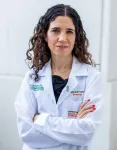(Press-News.org) Black adults who live in the United States have a 59% higher risk of premature death than White adults.
A new study from Tulane University published in Lancet Public Health has found that this gap can be entirely explained by disparities in eight areas of life critical to health and well-being: employment, income, food security, education level, access to healthcare, quality health insurance, home ownership and marital status.
These eight factors are called social determinants of health. Using data from the National Health and Nutrition Examination Survey, a CDC survey used to determine disease prevalence and risks across the country, Tulane researchers modeled the impact of each factor on a person’s life expectancy. When all unfavorable social determinants were accounted for, the 59% mortality disparity was reduced to zero.
“It totally disappeared,” said Josh Bundy, lead author and epidemiologist at Tulane’s School of Public Health and Tropical Medicine. “There’s no difference between Black and White premature mortality rates after accounting for these social determinants.”
While the mortality gap has been largely pinned on socioeconomic factors such as education level, income and employment status in recent years, researchers have acknowledged that these factors only explained most of the gap, Bundy said.
“This is the first time that anyone completely explained the differences,” Bundy said. “We didn’t expect that, and we were excited about that finding because it suggests social determinants should be the primary targets for eliminating health disparities.”
Socioeconomic factors were still found to play a major role, accounting for approximately 50% of the Black-White difference in mortality in the study. However, the other nearly 50% of the difference was explained by marital status, food security and whether someone has public or private health insurance, softer indicators that can speak to a person’s social support network, stability or job quality.
Unfavorable social determinants of health were more common among Black adults and were found to carry enormous risk.
Having just one unfavorable social determinant of health was found to double a person’s chances of an early death. With six or more, a person has eight times higher risk of premature mortality.
Jiang He, the corresponding author and Joseph S. Copes Chair of Epidemiology the School of Public Health and Tropical Medicine, said these results “demonstrated that race-based health disparities are social, not biological, constructs.”
Bundy agreed, adding that the findings explain how “structural racism and discrimination lead to worse social risk factors, which may lead to premature death.”
“So how do we eliminate the structural differences between races?” Bundy said. “And regardless of race, if you have six or more of these factors, you’re at a really high risk. How do we address these issues for everyone?”
As a concept, social determinants of health is a relatively new framework being emphasized by the CDC’s Healthy People 2030 initiative.
Going forward, Bundy hopes the concept gains more traction and that policymakers use these findings to address the race-based mortality gap.
“These social determinants of health are the foundation of health problems,” Bundy said. “They need to be a top priority going forward and it’s going to take policy, research and a multi-disciplinary approach to tackle these issues.”
END
Study finds that eight factors put Black adults at greater risk of early death
The findings show that America's race-based mortality gap is a social, not biological, construct and can be addressed via eight factors
2023-05-26
ELSE PRESS RELEASES FROM THIS DATE:
Early toilets reveal dysentery in Old Testament Jerusalem
2023-05-26
A new analysis of ancient faeces taken from two Jerusalem latrines dating back to the biblical Kingdom of Judah has uncovered traces of a single-celled microorganism Giardia duodenalis – a common cause of debilitating diarrhoea in humans.
A research team led by the University of Cambridge say it is the oldest example we have of this diarrhoea-causing parasite infecting humans anywhere on the planet. The study is published in the journal Parasitology.
“The fact that these parasites were present in sediment from two Iron Age Jerusalem cesspits suggests that dysentery was endemic in the Kingdom of Judah,” ...
Are Emergency Departments unsafe? Patients and professionals think so
2023-05-26
Emergency departments (EDs) are currently unsafe places for both professionals and patients, according to the results of an international survey carried out for the European Society of Emergency Medicine (EUSEM) and published today (26th May) in the European Journal of Emergency Medicine1. The main reasons for this are staff shortages and overcrowding due to the non-availability of beds in wards necessitating the provision of care in corridors. Respondents to the survey also felt that they had insufficient support from hospital management.
Around 90% of professionals surveyed felt that at times the number of patients ...
New study explores how exposure to mix of toxic metals impacts developing kidneys
2023-05-25
Chronic kidney disease is a growing problem worldwide and in the aging U.S. population. But could the groundwork for this progressive disease have been laid while its victims were still in utero?
Newly launched research at the University of Pittsburgh School of Public Health seeks to determine if pregnant mothers’ environmental exposure to toxic metals impacts kidney development in their babies, setting the stage for a problem that doesn’t become apparent until the baby is an adult.
The National Institutes of Health recently awarded a three-year, $2.2 million “high risk, high reward” grant to Dr. Alison ...
University of Cincinnati cancer experts present research at ASCO annual meeting
2023-05-25
University of Cincinnati Cancer Center researchers will present abstracts at the American Society of Clinical Oncology (ASCO) annual meeting 2023, held in Chicago June 2-6.
New trial tests immunotherapy before liver transplant
Liver transplant is the best treatment for early stage liver cancer in patients with liver cirrhosis, but 25% to 35% of patients fail to reach the transplant stage due to the cancer’s progression while waiting for a transplant.
UC’s Davendra Sohal, MD, will present information ...
Types of bacteria vary widely in tumors of people with early vs. late-onset colorectal cancer
2023-05-25
WASHINGTON --- Researchers at Georgetown University’s Lombardi Comprehensive Cancer Center studied the microbiome of people with colorectal cancer and found the make-up of the bacteria, fungi and viruses in a person’s tumor varied significantly depending on whether they were diagnosed with early-onset disease (age 45 or younger) or late-onset disease (age 65 or older). These results may help answer the riddle of why more young people are developing colorectal cancer, particularly those who ...
ASCO: Luspatercept enables majority of patients with MDS to end reliance on blood transfusions
2023-05-25
ABSTRACT: 7003
Treatment with luspatercept improved red blood cell counts and erythroid responses compared to treatment with epoetin alfa in patients with myelodysplastic syndromes (MDS), allowing the majority to no longer require regular blood transfusions. Results from the Phase III COMMANDS trial, led by researchers at The University of Texas MD Anderson Cancer Center, were reported at the 2023 American Society of Clinical Oncology (ASCO) Annual Meeting.
The study evaluated the efficacy and safety of first-line treatment with luspatercept, which enhances red blood cell maturation, compared with epoetin alfa, a therapy commonly used for low blood cell count, ...
ASCO23: ‘Better sexual health for female patients on endocrine therapy: Strategies across the age spectrum’
2023-05-25
MIAMI, FLORIDA (Strictly EMBARGOED Until May 25, 2023, at 5 P.M. EDT) – Breast cancer treatments that can save a woman’s life can seriously harm her sexual health, says Dr. Kristin E. Rojas, a breast cancer surgeon at Sylvester Comprehensive Cancer Center at the University of Miami Miller School of Medicine. Although doctors have not historically been prepared to help patients manage these toxic side effects, Rojas is leading efforts to turn the tide.
Rojas, both a fellowship-trained breast surgical oncologist and a gynecologic surgeon, is a national leader in treating sexual dysfunction in female ...
ASCO23: ‘Safety & efficacy of the novel BRAF inhibitor FORE8394 in patients with advanced solid & CNS tumors’
2023-05-25
MIAMI, FLORIDA (EMBARGOED UNTIL MAY 25, 2023, AT 5 P.M. ET) – An early-phase study led by researchers at Sylvester Comprehensive Cancer Center at the University of Miami Miller School of Medicine along with other Cancer Centers, suggests that an experimental therapy may have promising results in treating cancers with BRAF gene alterations – including certain mutations not previously targeted by BRAF inhibitors.
The Phase 1/2a study looking at safety and dosing enrolled 113 patients and targeted a wide range of cancers, including high-grade glioma, low-grade glioma, colorectal cancer, papillary thyroid cancer, melanoma, pancreatic cancer, ovarian cancer, non-small cell ...
MD Anderson Research Highlights: ASCO 2023 Special Edition
2023-05-25
CHICAGO ― The University of Texas MD Anderson Cancer Center’s Research Highlights showcases the latest breakthroughs in cancer care, research and prevention. These advances are made possible through seamless collaboration between MD Anderson’s world-leading clinicians and scientists, bringing discoveries from the lab to the clinic and back.
This special edition features presentations by MD Anderson researchers at the 2023 American Society of Clinical Oncology (ASCO) Annual Meeting. In addition to these studies, forthcoming press releases will highlight groundbreaking clinical research, including Phase III trial results evaluating ...
Penn Medicine at the 2023 ASCO Annual Meeting
2023-05-25
CHICAGO – Researchers from the Abramson Cancer Center and Perelman School of Medicine at the University of Pennsylvania will present data on the latest advances in clinical cancer research at the 2023 American Society of Clinical Oncology (ASCO) Annual Meeting from June 2-6 in Chicago, Illinois. Follow us on Twitter @PennMDForum and @PennCancer for updates.
Expert Interviews
Experts from the Perelman School of Medicine are available to comment on a wide range of topics in cancer science and medicine during the meeting on site and by video call, telephone, or email. To arrange interviews, please contact Meagan Raeke at Meagan.Raeke@pennmedicine.upenn.edu ...
LAST 30 PRESS RELEASES:
Kidney cancer study finds belzutifan plus pembrolizumab post-surgery helps patients at high risk for relapse stay cancer-free longer
Alkali cation effects in electrochemical carbon dioxide reduction
Test platforms for charging wireless cars now fit on a bench
$3 million NIH grant funds national study of Medicare Advantage’s benefit expansion into social supports
Amplified Sciences achieves CAP accreditation for cutting-edge diagnostic lab
Fred Hutch announces 12 recipients of the annual Harold M. Weintraub Graduate Student Award
Native forest litter helps rebuild soil life in post-mining landscapes
Mountain soils in arid regions may emit more greenhouse gas as climate shifts, new study finds
Pairing biochar with other soil amendments could unlock stronger gains in soil health
Why do we get a skip in our step when we’re happy? Thank dopamine
UC Irvine scientists uncover cellular mechanism behind muscle repair
Platform to map living brain noninvasively takes next big step
Stress-testing the Cascadia Subduction Zone reveals variability that could impact how earthquakes spread
We may be underestimating the true carbon cost of northern wildfires
Blood test predicts which bladder cancer patients may safely skip surgery
Kennesaw State's Vijay Anand honored as National Academy of Inventors Senior Member
Recovery from whaling reveals the role of age in Humpback reproduction
Can the canny tick help prevent disease like MS and cancer?
Newcomer children show lower rates of emergency department use for non‑urgent conditions, study finds
Cognitive and neuropsychiatric function in former American football players
From trash to climate tech: rubber gloves find new life as carbon capturers materials
A step towards needed treatments for hantaviruses in new molecular map
Boys are more motivated, while girls are more compassionate?
Study identifies opposing roles for IL6 and IL6R in long-term mortality
AI accurately spots medical disorder from privacy-conscious hand images
Transient Pauli blocking for broadband ultrafast optical switching
Political polarization can spur CO2 emissions, stymie climate action
Researchers develop new strategy for improving inverted perovskite solar cells
Yes! The role of YAP and CTGF as potential therapeutic targets for preventing severe liver disease
Pancreatic cancer may begin hiding from the immune system earlier than we thought
[Press-News.org] Study finds that eight factors put Black adults at greater risk of early deathThe findings show that America's race-based mortality gap is a social, not biological, construct and can be addressed via eight factors




